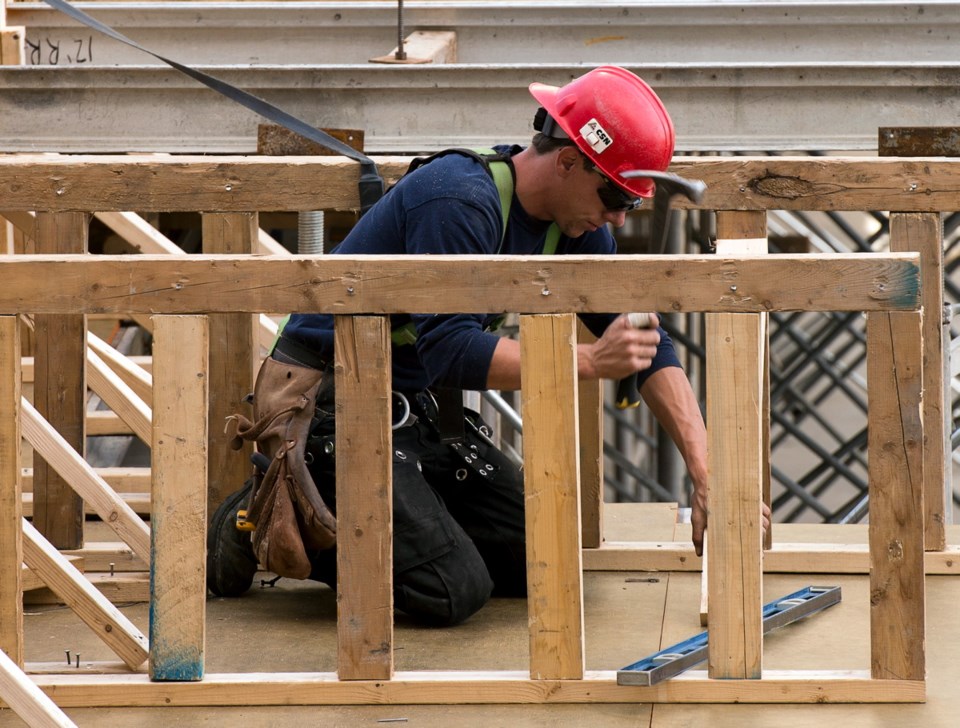A British Columbia construction industry team got a rock star's welcome at job fairs in Ireland, where out-of-work tradespeople are desparate for jobs being offered in B.C.'s north.
At a job fair in Dublin, 10,000 workers came through the door, said Abigail Fulton, B.C. Construction Association vice-president. The delegation also set up in Cork and Belfast and made a trip to Glasgow, Scotland, where they met thousands more job hunters.
"It was non-stop for three weeks," Fulton said of the trip during September and October.
About 150 job offers were made during the trip. Boxes packed with resumés are being shipped to Fulton's office, and applications arrive electronically every day, she said. The association is contemplating a similar trip to the U.S.
Organizations representing B.C. union workers say the province has failed to deliver sufficient training systems, leading to the shortage of workers.
Last month, the provincial government launched a skills and training plan to boost trades and technical skills.
Employers need skilled workers to enable them to bid on infrastructure projects, Fulton said.
"We are looking for specific skills and it is primarily for northern B.C.," Fulton said. "We have companies in northern B.C. who want 100 pipefitters."
In-demand trades also include carpenters, crane operators, insulators, pipelayers, plumbers, sheet metal workers and welders.
Ireland's unemployment rate was 14.8 per cent in September, far higher than B.C. at seven per cent.
"In Ireland, they had a big economic downturn in 2008 and they've never recovered," Fulton said.
"Construction has basically dried up. You've got all these incredibly skilled workers who really haven't been able to find long-term work for a number of years. So they are pretty determined to go abroad."
The Irish apprenticeship system is excellent and the training matches up very well with Canada, Fulton said. Irish apprenticeships start between ages 16 and 18, she said. "So you get a 30-year-old tradesman who has a ton of experience."
Most hopeful workers who met with the construction team want to stay in Canada, Fulton said.
"They're happy to go to northern B.C. as well, which is really fantastic."
Major development in B.C.'s north is anticipated to continue for years. The province said $48 billion is expected to be invested in liquefied natural gas between 2013 and 2022.
About $80 billion is now being spent on major projects under construction - everything from shipbuilding to mining and energy.
B.C.'s labour market outlook predicts one million job openings by 2020. By then, the report said there will be a shortage of 61,500 workers.
"What's really important for everyone to understand is that we are looking for specific skills and it is primarily for northern B.C.," Fulton said. "This is a specific [skill] set that we can't find in B.C. That's why we are bringing in the Irish. We are not taking away from British Columbia."
The B.C. Construction Association runs a skilled trades employment program to match workers with employers. If a worker with desired skills is willing to relocate to Fort St. John, for example, "give us a call," Fulton said.
A recent controversy has erupted over a mining company bringing in Chinese workers to northern B.C.
"Our responsibility is to open the doors first to the people who live in this province. That's our fundamental responsibility and I think we failed at that in many ways," said Jim Sinclair, president of the B.C.
Federation of Labour. "So the result is that we have shortages in a number of areas as we want to develop the economy of the province. Therefore that economic development is flawed because it has to bring in people from other parts of the world to work."
The federation has recommended that public tenders require a minimum number of apprentices, something not mandatory now, he said. Also, B.C.'s apprenticeship system needs to be rebuilt after being dismantled in 2003, Sinclair said.
"We have a real lack of support and co-ordination on the training side."
Lee Loftus, president of the B.C. Building Trades, representing union workers, said "we have skilled British Columbians that are out of work. I would rather see them being offered jobs at a reasonable rate and compensation first and then supplement any remaining shortages from other communities of equal or greater qualifications."
Vancouver Island's construction industry is expecting demand for workers to ramp up in earnest early next year. Demand is currently trade specific and depends on the area and the stage of a project is at, said Greg Baynton, Vancouver Island Construction Association chief executive.
In recent days, Baynton has received two calls from employers who have not been able to fill openings for project managers, which are mid-to-senior level management jobs.
"I haven't had a call like that - ever," he said.
"[Employers] are recognizing they need to go further afield, including east of Manitoba, given the economies of Alberta, Saskatchewan and B.C. have high demand for those kinds of people," he said.
Currently several condominium and rental projects are underway, as well as shopping mall upgrades and expansion and ongoing modernization of the fleet maintenance centre at CFB Esquimalt.
Demand for workers will increase in 2013, Baynton said, citing such developments as the $1.35-billion replacement of the John Hart Generating Station at Campbell River, three new schools in Greater Victoria, and two Island hospitals.
"Those are big enough that they will really impact the local labour supply."
Last month, the province announced a skills and training plan featuring $75 million to improve training facilities and equipment, a goal of increasing by 50 per cent the number of high school graduates moving into trades or technical training, plans to expand apprenticeship opportunities and student financial aid for in-demand skills.
Camosun College is getting up to $943,000 in employment skills access funding, from federal and provincial governments, for job-readiness programs, it was announced Thursday.
The college is also receiving $30 million to double its trades training space at its Interurban campus.



